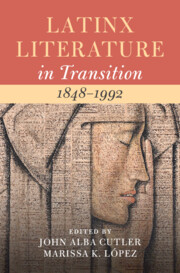Book contents
- Latinx Literature in Transition, 1848–1992
- Latinx literature in transition
- Latinx Literature in Transition, 1848–1992
- Copyright page
- Dedication
- Contents
- Figures
- Contributors
- Acknowledgments
- Introduction
- Part I Space
- Part II Being
- Part III Time
- Part IV Form
- Part V Labor
- Chapter 17 Seeking Parteras in the Archive
- Chapter 18 The Work of War
- Chapter 19 Farmworker Culture in Literature and Film, or Tomás Rivera’s Brown Noir
- Chapter 20 The Specter of Neoliberalism
- Bibliography
- Index
- References
Chapter 19 - Farmworker Culture in Literature and Film, or Tomás Rivera’s Brown Noir
from Part V - Labor
Published online by Cambridge University Press: 10 April 2025
- Latinx Literature in Transition, 1848–1992
- Latinx literature in transition
- Latinx Literature in Transition, 1848–1992
- Copyright page
- Dedication
- Contents
- Figures
- Contributors
- Acknowledgments
- Introduction
- Part I Space
- Part II Being
- Part III Time
- Part IV Form
- Part V Labor
- Chapter 17 Seeking Parteras in the Archive
- Chapter 18 The Work of War
- Chapter 19 Farmworker Culture in Literature and Film, or Tomás Rivera’s Brown Noir
- Chapter 20 The Specter of Neoliberalism
- Bibliography
- Index
- References
Summary
This chapter focuses on examples of Rivera’s “brown noir” that use noir conventions to draw into critical relief the intersection of anti-Mexican racism, labor exploitation, and patriarchy. Rivera’s brown noir dramatizes the pitfalls of taking vicarious pleasure in film and related representations where work, heterosexual romance, or education inexorably leads to happy endings. Experiences of vicarious pleasure, Rivera suggests, can be contradictory, toggling between appeals to incorporation and the recognition of exclusion and subordination. On the one hand, he was interested in how cinema as an ideological state apparatus encourages farmworkers to take vicarious pleasure in images that are hurtful and oppressive. On the other hand, in his literary and cultural essays, Rivera also analyzed contexts in which farmworkers turned such cinematic appeals into opportunities for critical thinking about the disjuncture between film representations and their own lives. He suggests that, because Hollywood films formally appeal to farmworkers while practically excluding them from representation (or incorporate them as minor, subordinate characters), appeals to vicarious pleasures can generate insights into the construction of social hierarchy and inequality. Rivera dramatized his theories about vicarity in his brown noir film treatment for his story “La mano en la bolsa”/“Hand in His Pocket.”
- Type
- Chapter
- Information
- Latinx Literature in Transition, 1848–1992 , pp. 333 - 348Publisher: Cambridge University PressPrint publication year: 2025

